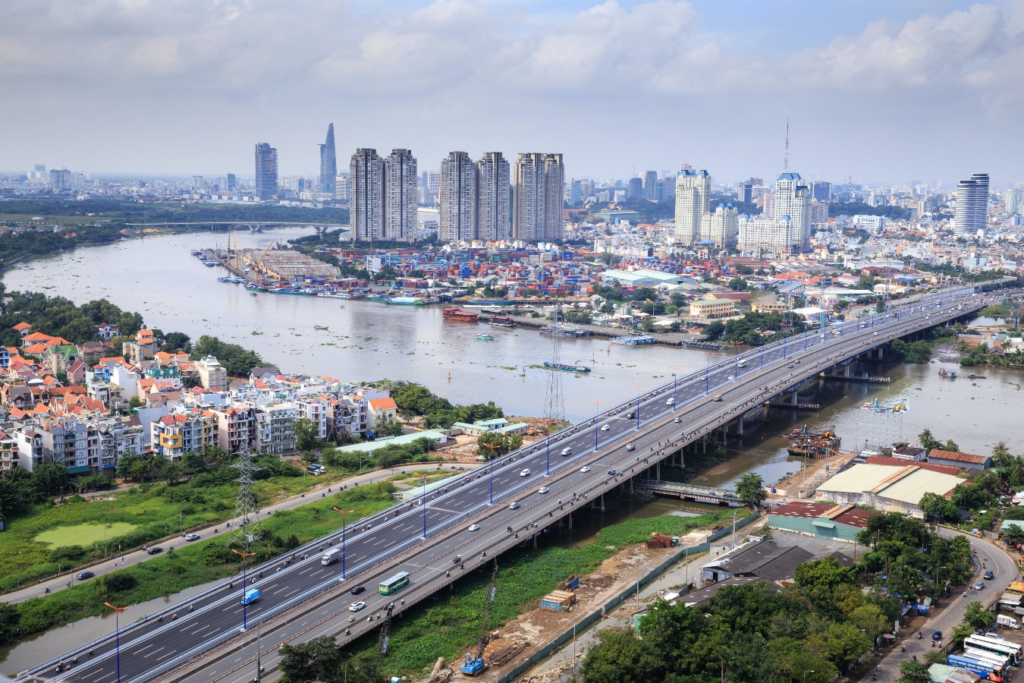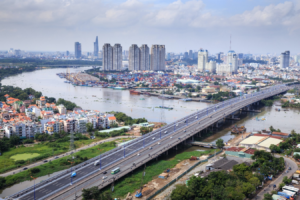
With its vibrant culture, beautiful landscapes, and a growing economy, Vietnam has become a hot spot for real estate investment. The country’s real estate industry has been on a steady rise, attracting both domestic and international buyers. In this article, we will delve into the key market insights of Vietnam’s booming real estate industry and explore the factors driving its growth.
One of the major catalysts behind Vietnam’s real estate boom is the government’s favourable policies and incentives for foreign investors. In recent years, the government has loosened restrictions on foreign property ownership, making it easier for overseas buyers to invest in the country’s real estate market. Additionally, Vietnam’s growing middle class and favourable demographics have also contributed to the surge in demand for housing and commercial properties.
From luxury condominiums in Ho Chi Minh City to beachfront villas in Da Nang, Vietnam offers a wide range of investment opportunities for real estate enthusiasts. As we delve deeper into this article, we will discuss the key trends, market insights, and investment prospects in Vietnam’s real estate industry.
Stay tuned to discover how Vietnam’s real estate market is changing and the potential opportunities it presents for investors both regionally and globally.
Factors driving the growth of the real estate industry in Vietnam
Vietnam’s real estate industry has experienced significant growth in recent years, driven by several key factors. One of the major catalysts behind this boom is the government’s favourable policies and incentives for foreign investors. In an effort to attract more foreign capital, the government has loosened restrictions on foreign property ownership, making it easier for overseas buyers to invest in the country’s real estate market. This has led to a surge in demand for properties, both residential and commercial, from foreign investors.
Another factor driving the growth of Vietnam’s real estate industry is the country’s growing middle class and favourable demographics. With a young and dynamic population, there is a strong demand for housing and commercial properties. The rising disposable income and improving living standards have fuelled the demand for better and more luxurious properties, especially in urban areas. As a result, developers are focusing on building high-end residential complexes and mixed-use developments to cater to this growing demand.
Furthermore, Vietnam’s strategic location in Southeast Asia and its increasing integration with the global economy have attracted foreign investors looking for new investment opportunities. The country’s membership in various trade agreements, such as the ASEAN Free Trade Area and the Comprehensive and Progressive Agreement for Trans-Pacific Partnership, has opened up new markets and increased business activities, leading to higher demand for commercial real estate in growing countries like Vietnam.
Key market insights and trends in the real estate industry
Vietnam’s real estate market is dynamic and constantly evolving. It is important for investors to stay updated on the latest market insights and trends to make informed investment decisions. One key trend in the market is the increasing popularity of mixed-use developments. These developments combine residential, commercial, and retail spaces, providing residents with convenient access to amenities and services. With the growing urban population and changing lifestyles, mixed-use developments have become highly sought after in Vietnam.
Another key insight is the growing demand for eco-friendly and sustainable properties. With increasing environmental awareness and a focus on green living, developers are incorporating sustainable design and energy-efficient features into their projects. This not only appeals to environmentally conscious buyers but also helps reduce operating costs for property owners in the long run.
Additionally, the rise of technology is also shaping the real estate industry in Vietnam. Digital platforms and online marketing have become essential tools for property developers and agents to showcase their projects and reach potential buyers. Virtual reality tours and 3D visualizations have also become popular, allowing buyers to explore properties remotely and make more informed decisions.
Residential real estate market in Vietnam
The residential real estate market in Vietnam has been experiencing strong growth, driven by the rising demand for housing from the country’s growing population. Urbanization and increasing urban migration have led to a shortage of affordable housing in major cities, creating opportunities for developers to meet this demand.
In recent years, there has been a particular focus on luxury condominiums and high-end residential projects in urban areas such as Ho Chi Minh City and Hanoi. These developments offer modern amenities, state-of-the-art facilities, and premium services to cater to the growing affluent class in Vietnam. Foreign investors, especially those from neighbouring countries like China and South Korea, have shown great interest in these properties.
In addition to luxury properties, affordable housing initiatives have also gained traction in Vietnam. The government has implemented various policies and programs to address the housing needs of low-income families. These initiatives aim to provide affordable housing options and improve living conditions for the less privileged segments of society.
Commercial real estate market in Vietnam
The commercial real estate market in Vietnam has been growing steadily, driven by the country’s strong economic growth, and increasing foreign investment. Vietnam’s strategic location and its status as a manufacturing hub have attracted multinational companies looking to expand their operations in the region. This has led to a high demand for office spaces, industrial parks, and logistics facilities.
Ho Chi Minh City and Hanoi are the main commercial hubs in Vietnam, offering a wide range of office spaces and retail properties. The demand for Grade A office spaces has been particularly strong, driven by the entry of multinational corporations and the growth of the local business sector. In recent years, there has also been an increase in the development of co-working spaces and flexible office solutions to cater to the needs of startups and small and medium-sized enterprises.
In the retail sector, Vietnam has seen a surge in the number of shopping malls and retail centres. The rise of the middle class and changing consumer behavior have contributed to the growth of the retail market. International brands are expanding their presence in Vietnam, capitalizing on the increasing purchasing power of Vietnamese consumers.
Investment opportunities in the real estate sector
Vietnam’s booming real estate industry offers a wide range of investment opportunities for both domestic and international investors. The residential sector, particularly luxury properties in urban areas, presents attractive investment prospects. The rising middle class and increasing urbanization are expected to drive the demand for high-quality housing in the coming years.
The commercial sector also offers lucrative investment opportunities, especially in office spaces and retail properties. With the influx of multinational corporations and the growth of the business sector, there is a strong demand for modern and well-equipped office spaces. Retail properties, especially in prime locations, have the potential for high rental yields and capital appreciation.
Furthermore, industrial properties and logistics facilities are another area of interest for investors. Vietnam’s manufacturing sector has been growing rapidly, attracting foreign companies looking to set up manufacturing facilities. Industrial parks and logistics facilities that cater to the needs of these companies have the potential for long-term growth and steady rental income.
Government regulations and policies affecting the real estate industry
The Vietnamese government plays a crucial role in shaping the real estate industry through its regulations and policies. In recent years, the government has implemented several measures to attract foreign investment and stimulate the real estate market. These include allowing foreign investors to own properties and granting longer leasehold rights for land.
The government has also introduced policies to promote affordable housing and social housing initiatives. These programs aim to provide housing options for low-income families and improve living conditions for the less privileged segments of society.
Furthermore, the government has been addressing issues related to land ownership and land use rights, which were previously major concerns for investors. Streamlining the land acquisition process and ensuring clear land titles have increased investor confidence in the market.
Key players in the real estate market in Vietnam
The real estate market in Vietnam is highly competitive, with several key players dominating the industry. Local developers, such as VinGroup, Novaland, and Sun Group, have been at the forefront of the market, developing large-scale projects in prime locations.
There are also international developers like CapitaLand, Keppel Land, and Mapletree, have also made significant investments in Vietnam’s real estate sector. These companies bring in international expertise and contribute to the development of high-quality projects.
However, if you are all looking for a simple online portal, which aggregates many premium real estate listings in Vietnam into one then check out Vietrealestate, which will make life much easier for you make many options in one simple online portal!
Real estate agencies and property management companies also play a vital role in the market, helping buyers and sellers navigate through the complex process of property transactions. These companies provide services such as property valuation, marketing, and tenant management. For example, you can visit Vietrealestate where you can research for about the Vietnam real estate market.
Conclusion: Future opportunities in the Vietnamese real estate industry
The future of Vietnam’s real estate industry looks promising, with a strong demand for housing and commercial properties driven by the country’s economic growth and favourable demographics. The government’s policies and incentives for foreign investors have attracted capital inflows and stimulated the market. The rise of the middle class and increasing urbanization further contribute to the growth of the industry.
While there are challenges and risks in the market, investors who stay informed and understand the dynamics of the industry can benefit from the opportunities that Vietnam’s real estate sector presents. With a wide range of investment options, from luxury residential properties to commercial spaces and industrial facilities, Vietnam offers a diverse and vibrant real estate market for both regional and global investors.
As Vietnam continues to develop and integrate into the global economy, the real estate industry is expected to play a significant role in driving economic growth and providing housing and infrastructure for its growing population. By staying updated on market insights and trends, investors can make informed decisions and capitalize on the opportunities that Vietnam’s booming real estate industry has to offer.
We hope you enjoyed this blog by Vietrealestate useful and please feel free to visit more of Vietnam news and articles found in our property blogs page. We wish your real estate journey in Vietnam!






